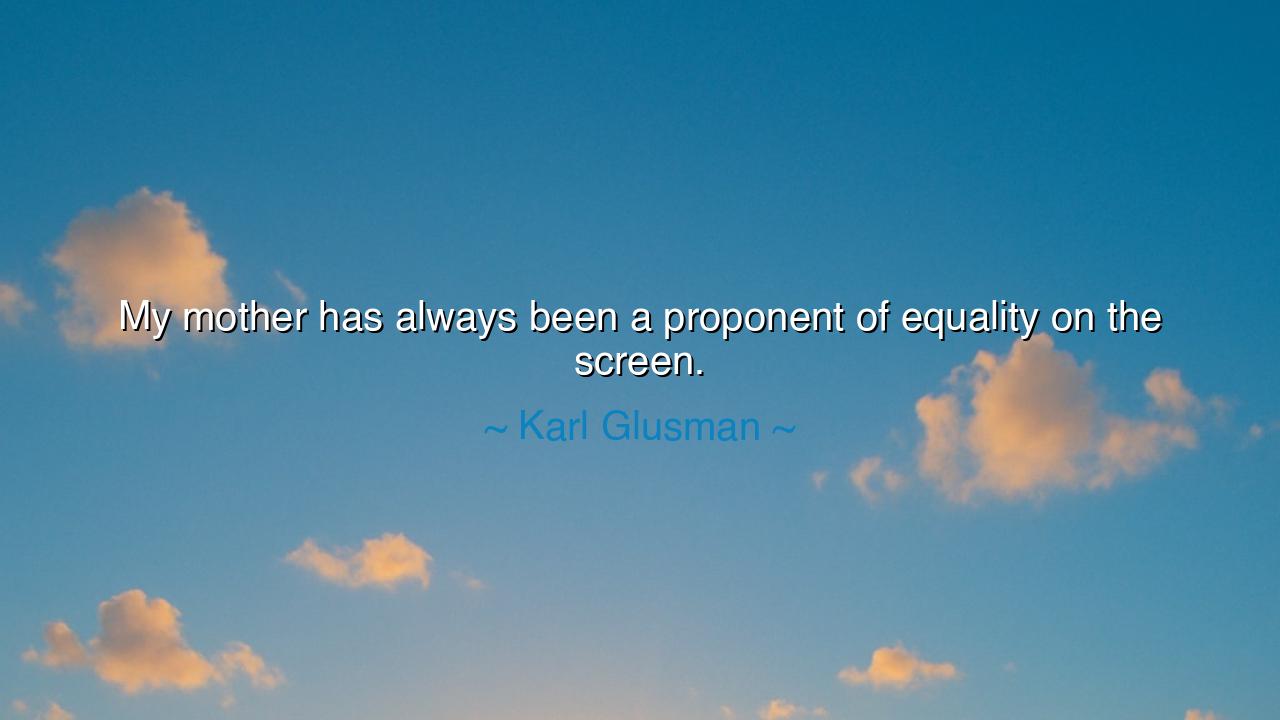
My mother has always been a proponent of equality on the screen.






O children of the future, listen well to the words of Karl Glusman, who speaks of the wisdom passed down to him by his mother—a woman who understood the power of equality and sought to instill it in every corner of life. Karl said, "My mother has always been a proponent of equality on the screen." These words are not mere reflections on a personal memory, but a deep call to recognize the profound importance of equality in all forms of human expression, particularly in the world of art and media.
In the world of cinema, as in all forms of storytelling, the screen is a mirror of society. What we see reflected before us shapes our understanding of who we are and how we relate to one another. To speak of equality on the screen is to speak of a vision that transcends mere representation. It is a call to ensure that all voices—regardless of their race, gender, or background—are heard and valued. For too long, the screen has been a place where certain voices have been silenced or distorted, where equality has been denied in favor of outdated and oppressive stereotypes. But a champion of equality, like Karl’s mother, sees beyond these confines, striving to present a world where all people are portrayed with respect, dignity, and truth.
Let us look to the tale of Sophocles, the ancient playwright who understood the power of the stage to reflect and shape society. In his famous play, Antigone, the hero is a woman, Antigone, who defies the orders of a king to honor the burial of her brother. In a time when women were often cast in the shadows of male figures, Sophocles placed her at the center of the story, giving her voice and agency. In doing so, he not only challenged the norms of his time but also spoke to the universal struggle for equality, showing that the stories of women, too, have the power to shape the world. Just as Sophocles dared to challenge the status quo, so too does Karl’s mother seek to break barriers in the world of film, pushing for a more inclusive and equal representation of all people.
Equality on the screen is not a new pursuit. It has long been fought for by visionaries like Katharine Hepburn, who defied the traditional roles expected of women in the film industry. Hepburn rejected the delicate, submissive characters that Hollywood demanded, choosing instead to portray strong, independent women who were unapologetically themselves. Her boldness in choosing roles that challenged the prevailing narratives of her time made her a trailblazer in the fight for gender equality in film. Like Hepburn, Karl’s mother understood that the screen is not just a place for entertainment; it is a space for change, for progress, and for the elevation of those whose voices have been too long ignored.
And yet, O children, equality on the screen is not just about the actors who step into the spotlight; it is about the stories that are told, the voices that are given power. Consider the rise of cinema in the 20th century, when the film industry began to shift and embrace more complex portrayals of marginalized groups. Spike Lee, a director and activist, used his films to shed light on the struggles and triumphs of the Black community in America. Through films like Do the Right Thing and Malcolm X, Lee not only challenged racial stereotypes but also used the screen as a platform for social change, showing that cinema can be a vehicle for the struggle for equality. Karl’s mother, much like Spike Lee, understood that equality on the screen is not just a matter of representation—it is a means of transforming the world.
The lesson Karl Glusman imparts to us, through the words of his mother, is one of courage and vision. To fight for equality on the screen is to fight for truth—the truth that every individual, regardless of their background, has the right to be seen and heard. Equality is not simply a noble goal but a fundamental human right that must be fought for, not only in society but also in the stories we tell. The screen is a place where we, as a society, can shape our collective future by choosing what we value and what we uplift. When we allow all voices to be heard, when we allow all stories to be told, we create a world where equality is not just a dream but a living reality.
So, children, let this wisdom guide you: in everything you do, whether in the arts or in daily life, strive to uphold the values of equality and justice. As Karl’s mother showed, equality on the screen is just the beginning. It is a call to create a world where all people are valued, where opportunity is equally shared, and where every individual can live freely and fully. Whether you are an artist, a storyteller, or simply a witness to the world, take up the mantle of those who have fought for equality before you. Let your actions, your words, and your creations reflect the deep truth that every person, regardless of their background, deserves to be seen with the dignity they are owed.






AAdministratorAdministrator
Welcome, honored guests. Please leave a comment, we will respond soon